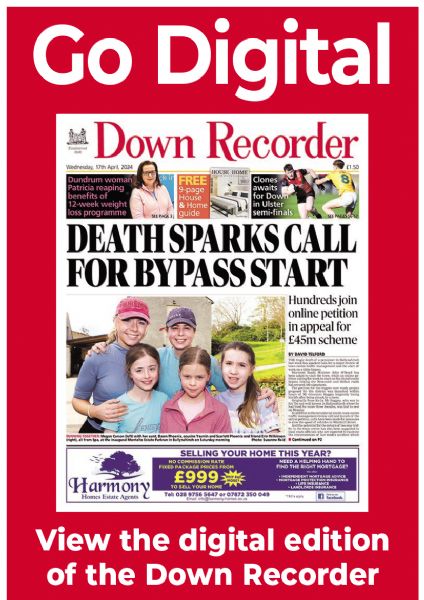People must be involved in future
People must be involved in future
18 January 2017
HOSPITAL campaigner Eamonn McGrady said community involvement in shaping the future delivery of health services is vital.
As part of the Department of Health consultation exercise on the reconfiguration of services, there are plans to engage with patient groups and while Down Community Health Committee chairman Eamonn McGrady said this is welcome, he warned the wider community must also be heavily involved.
He said departmental officials will understand local people’s scepticism because they have had a very bad experience over recent years with successive government initiatives having the centralisation of health services at their core.
“We took a decision almost two years ago to hold our big consultation when we asked the community in the Downpatrick area to come out and show their support for the restoration of 24-hour A&E services at our hospital, the reopening of the designated coronary care unit and for the Downe’s short stay unit, which sits in mothballs with the beds inside it, to be reopened.
“We got our answer with 20,000 people coming out on the streets but I do wonder what the impact of that rally was as it did not make any difference to the Department of Health because there is no obvious manifestation of change here on the ground,” declared Mr McGrady.
“I welcome the comments tonight from Chief Medical Officer Dr Michael McBride recognising that the Department was a bit slow to pick up on the shortage of doctors, with too much reliance on training positions and too much specialisation. It is good to hear that being said; the recognition that not all the initiatives and that not all that happened in the past was good. It’s like having a new Department of Health.”
Referring to current waiting lists, Mr McGrady said given the decision to take 16 per cent of acute beds out of hospitals in a place the size of Northern Ireland over a period of five years, it would be logical to think there might be a correlation with the waiting lists and pressures now being experienced.
Mr McGrady said the commitment given to address the ambulance cover issue was welcome and said campaigners believe there is a ‘fundamental principle’ which should run through all health care provision — people should be treated and cared for as close to home as is practical, possible and safe.
He continued: “Our community supports its local hospital in large numbers and we see practice changing in England where there is a focus on smaller, medium sized hospitals, but we hear a peculiar silence from our Department of Health and politicians on this issue. We need to get recognition of the needs of the rural community and by that I mean anyone outside Belfast.”
Mr McGrady highlighted the need to tackle staff shortages and urged those charged with redesigning health services to build confidence in the local community “because they have had such a terrible experience.” He said while the Downe was delivered as promised, the hospital is not providing all the services outlined in the business case which paved the way for its construction.
The campaigner said community confidence could be restored in the short term by restoring services which have been removed from the Downe, alongside the reintroduction of planned surgery. He also contended that opening the hospital’s short stay unit would very quickly provide some extra beds in the system.
In his closing message to Department of Health officials, Mr McGrady said the the community wants to work in partnership with them “but needs to see the colour of their coins” as over the past 30 years there was “consultation which seemed to have predetermined outcomes.”
He added: “The health service door has not always been opened by administrators towards the community to talk about health issues. If that has all changed or is changing, it is very welcome. You will have noticed how many people are at tonight’s meeting on a winter’s night. It is a fabulous attendance and I hope you will take the message back that local people have expectations about the health services that will be delivered to them in this community.”

